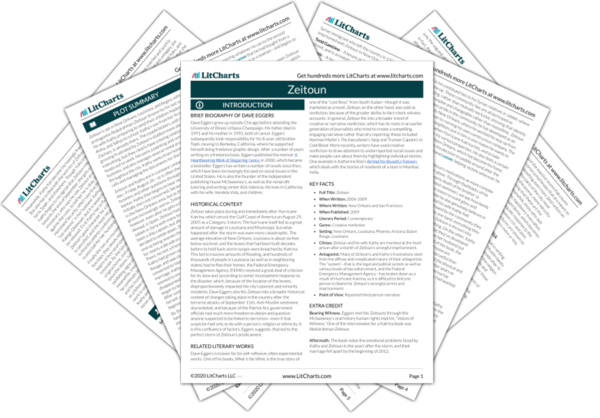Family, Community, and Home
Abdulrahman Zeitoun, the protagonist of Zeitoun, has found community in a number of places: in his family, in New Orleans, in the Muslim community, and in his continued ties to his Syrian relatives in Jableh, where he grew up. These community ties are all portrayed as coexisting, rather than mutually exclusive, showing that identity can be complex and changeable rather than monolithic. Zeitoun clearly takes pride in the community he has developed as an…
read analysis of Family, Community, and HomeCrime, Justice, and Injustice
With Zeitoun stranded in New Orleans and Kathy in Arizona with their children, two narratives on the fallout from Hurricane Katrina unfold. One, which Kathy hears largely from the media, is that Katrina has turned the city into a war zone, with stealing, shooting, and other illegal activity quickly becoming the norm. This sense of emergency creates a disconnect with her husband’s experience, at least initially: while he sees sporadic examples of looting, the days…
read analysis of Crime, Justice, and InjusticeFaith, Perseverance, and Dignity
The fact that Zeitoun owns a construction company takes on symbolic resonance in the book. As he attempts to help those stranded in New Orleans after Katrina, his efforts become another kind of rebuilding. Throughout the ordeal, he trusts that something good will come out of both his efforts and those of others—efforts that counter the corruption of the authorities. Zeitoun’s Muslim faith is crucial to his perseverance, as he puts his trust in God…
read analysis of Faith, Perseverance, and Dignity
Human vs. Natural Tragedy
Hurricanes like Katrina are known as “natural disasters,” as the events themselves are outside of human control. Zeitoun is certainly aware of this, and he holds great respect for nature, understanding the powerful forces of water that both killed his older brother (who drowned many years earlier) and wrought such devastation on New Orleans. But the book also shows that there is always a human component to such tragedies as well.
In New Orleans, it…
read analysis of Human vs. Natural TragedyIslam and Islamophobia
Part of Dave Eggers’s purported goal in writing Zeitoun was to introduce a “normal” Muslim family to American readers who, almost a decade after 9/11, might have a limited or even prejudiced view of the religion and of Muslim cultures. By portraying a Muslim family and tracing its beliefs and practices, Zeitoun seeks to counter these limitations and suggest that being Muslim is entirely compatible with being American—indeed, it is just one facet of American…
read analysis of Islam and Islamophobia






